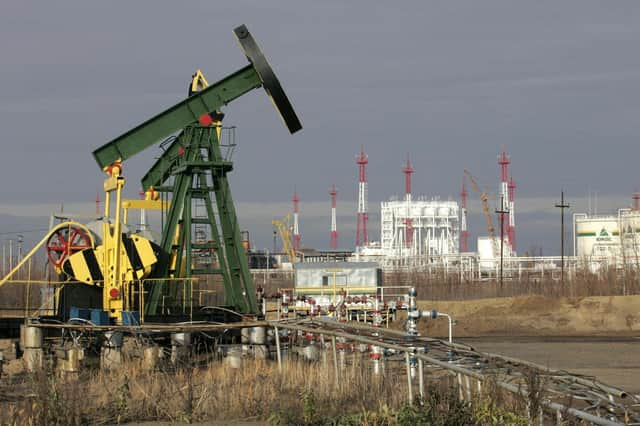As Ukraine War rages, volatile oil prices could hit economy for years – Professor Alex Kemp


Historically this volatility has been related to supply shocks, such as large new discoveries, intervention by Opec, and wars among important producing countries. Demand-based shocks such as the effects of the financial crisis in 2008 have also been major influences on the market.
The Russian Federation has been a major oil producer and exporter for many years. Production in 2021 exceeded 12 per cent of the world total. Crude oil exports in 2021 amounted to 1.75 million barrels per day and product exports 370,000 barrels per day. Thus any significant disruption to production and the flow of exports was bound to have a substantial upward effect on the market price.
Advertisement
Hide AdAdvertisement
Hide AdIn turn the size of this effect will depend on several factors, principally, one, the effect on consumer demand, two, the perception among market traders about how long the interruption will last, and, three, the reaction of producers from alternative sources of supply.
On the demand side, it is well understood that final consumers generally have difficulty in reducing their use of petroleum products in the short run. There are no ready substitutes available.
Only in the longer term can consumers switch to electronic cars. Currently the purchase price constitutes a problem. Eventually lower capital costs and the wider availability of charging points will encourage switching to electronic vehicles and also to hydrogen-based vehicles.
On the supply side, it is clear that the world possesses ample oil reserves. The ratio of proven reserves to annual production is around 50 to one. This means that, using this conservative definition of reserves, there is enough oil to meet the world’s current requirements for 50 years.
But the further exploitation of these reserves requires time. The industry generally operates on a 24 hours per day, 365 days per year basis. It takes time – generally years – to develop new fields, especially those located offshore. In the case of onshore fields, including those exploited by fracking technology, the time span is considerably less.
But even in this case, the industry in the USA is still experiencing the after-effects of the price crash in 2020 which is modifying the rate at which extra drilling and thus increased production is achieved.
The Russia-Ukraine war has resulted in sanctions being imposed on Russian interests by Western countries. These can apply to oil traders. As a consequence, some are now reluctant to handle Russian oil.
By itself this results in the demand for non-Russian oil increasing and thus increasing the price. This has also led to some countries deciding to purchase Russian oil at heavily discounted prices.
Advertisement
Hide AdAdvertisement
Hide AdFor many years, the actions of Opec have had a major influence on the oil price, given the organisation’s importance in terms of proven oil reserves and production. In early 2020 the organisation had no unified policy to deal with the price crash following the widespread effect of Covid on world demand.
However, in April of that year an agreement among Opec and other countries – including Russia – was struck involving a major reduction of production. Altogether 23 countries were involved.
Broadly speaking, the terms of this agreement have prevailed. Production was reduced by 9.7 million barrels per day in 2020 and has gradually been increased to reach their 2018 levels in 2022.
Despite the request by western countries, particularly the USA, to encourage Opec+, as the 23 countries are known, to increase production further, these requests have not met with success.
Traders play a major role in price determination. In current circumstances, they have to take a view over the fundamentals of demand and supply, as noted above, but also on the effect of the Russia-Ukraine war and its aftereffects.
Recently this has produced major rethinks on the prospects. Thus in late February 2022, the spot price rose sharply from around $80 per barrel to exceed $100. But the expectation in the futures market was that it would fall back to around $80 by 2025.
The latest thinking of the Office for Budget Responsibility is that the price could fall to around $90 over the next few years. But another scenario is that the price spike could reach $150 and then fall sharply to around $80 in a few years’ time. Yet another scenario is that there could be a persistent price shock which would result in a price path in the $145 to $150 range over the next few years.
There are thus many scenarios, each of which may be internally consistent but are based on different assumptions, particularly regarding the direct and indirect effects of the Russia-Ukraine conflict.
Advertisement
Hide AdAdvertisement
Hide AdOver the next few years, it will be difficult for western countries to procure complete independence from Russian oil. Investment and production from alternative sources take time to deliver even with encouragement from host governments.
In many of these countries, there are also hurdles to be overcome before new investment can be sanctioned, reflecting constraints due to environmental concerns over carbon dioxide emissions. Electrification of producing systems using renewable energy sources, rather than diesel or fuel gas, is not financially straightforward.
From the motorist’s viewpoint, the prospect is for pump prices to remain very volatile for some years ahead. Governments have to acknowledge the fuel poverty problem in all its dimensions, including the house-heating needs of consumers as well as motorists. The problem will be with us for some time and requires very early attention.
Alex Kemp is professor of petroleum economics and director of the Aberdeen Centre for Research in Energy Economics and Finance at the University of Aberdeen
Comments
Want to join the conversation? Please or to comment on this article.
